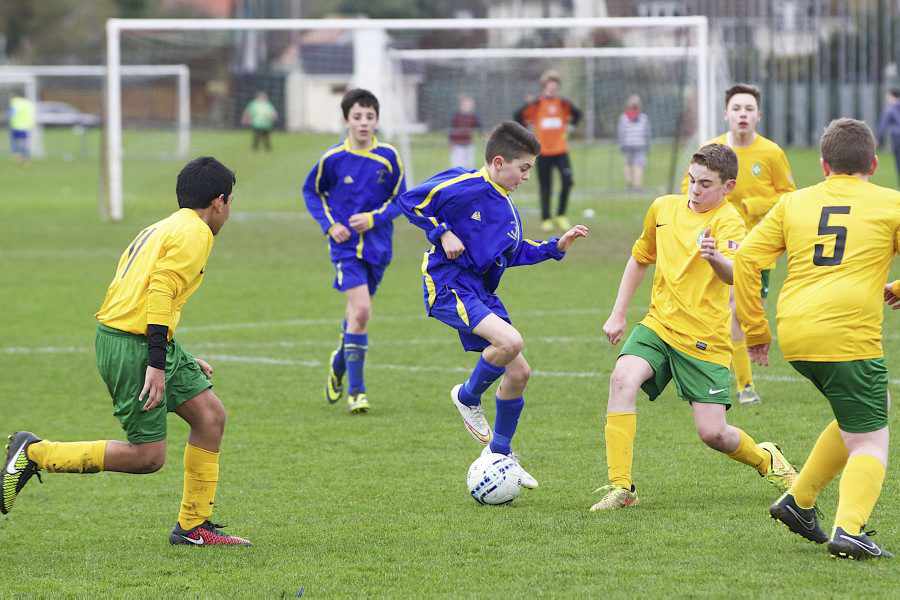The move, which attracted nationwide interest over the weekend (it was discussed live on the BBC’s Breakfast show on Saturday and was published in the national newspapers), has brought to an end the release of scores from one-sided games by the JFC as they look to promote development from under-11 through to U14. Matches that finish with a score difference of more than five goals will now be published as ‘Club A’ beat ‘Club B’ (the clubs will be named).
A host of comments have been made in response to the change (200-plus appeared on the Daily Mail’s website following their coverage of the story), and the majority imply it will pave the way for less competitive football.
However, Welsh is keen to refute suggestions that the Island is turning into a ‘nanny state’, and says the issue has been blown out of proportion.
‘You have to understand development football to understand why we’ve done it,’ Welsh explained. ‘There have been a lot of comments about us mollycoddling youngsters and that it’s a bit of a nanny state … what we’re actually trying to do is create more competitive football so that players are developing at an appropriate level. We are not trying to develop less competitive players, which is what we’ve been criticised for, it’s exactly the opposite.
‘I’ve been surprised by the amount of publicity that it has amassed, because this isn’t about preventing the wider public from getting the result, it’s actually a message to the coaches saying “we’re not going to encourage and publicise you going out and beating a side 15-0”. I don’t think it will have a great effect on the results, but I do hope it will have an effect on the thinking of the coaches in the way they manage games.’

Welsh added: ‘We’re not trying to hide the scores. They are still out there on social media and they’ll still be on the FA Full Time website – all we’re saying is we’re not going to highlight them.
‘We as a junior committee firmly believe there’s no advantage whatsoever in publicising mismatched, one sided games where players aren’t developing as they should be, and we make no apology for the decisions we’ve made over the last number of years. We’ve gone to single age groups, we’ve gone to development leagues up to U14 and there’s no goal difference in any of the leagues, so again I ask the question, why would we be promoting 20-0 wins when we haven’t got goal difference and the lower divisions aren’t even playing for points?
‘Are we mollycoddling them? No, we’re trying to create more competitive football but in an environment where they can learn.
‘We had an U11 game that was 20-0 a couple of weeks ago – I’d be amazed if anybody learned very much out of that game. It’s probably more likely that half a dozen boys will go and play another sport, because the losers couldn’t have had an enjoyable afternoon and I would hazard a guess that half of the winning team wouldn’t have had a particularly enjoyable afternoon either.
‘It’s got to be a learning process … gone are the days where it’s win at all costs. People are player focused now and focused on developing our players to the best that they can be. And the proof is in the pudding as we’ve got people playing professional football that have come through the system.’
Rozel Rovers U11 manager Steve Falle agrees with Welsh’s sentiments, particularly when it comes to the responsibilities of the coaches.
‘I have been on both ends of these results, and from my perspective it is not nice seeing it published,’ said Falle. ‘I know that my boys hate seeing those results in the paper, so I’m in support of Jon in that respect. But I also know kids like to see their names published, so it is difficult.
‘We’re development clubs playing in leagues with no positions, no points and no trophies so taking results out of the paper does help teams, but clubs do still need to take responsibility. If you know you’re going to hammer somebody you should make changes to stop it happening, as we could end up having weaker clubs losing their stronger players to stronger clubs, and that doesn’t help anyone.’
The Island’s football development officer, Brian Oliver, is also on side with the idea, offering Welsh support against the national critics. But he has expressed reservations about the cut-off point.
‘There are clearly some concerns over high scoring matches and the league are trying desperately, as we are, to keep as many people in the game,’ said Oliver. ‘We have particular challenges in a smaller community and results may have a bigger impact here than on the mainland.
‘There could be a debate over the figure, as five does seem a bit low, but that’s the decision the league have taken and we support that. We know they’re acting in the best interests of football in Jersey.’






